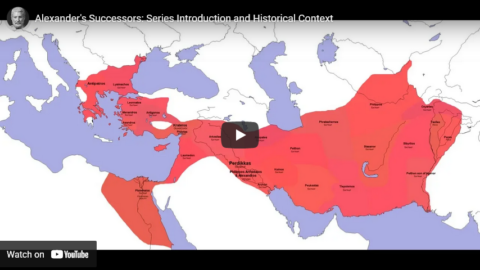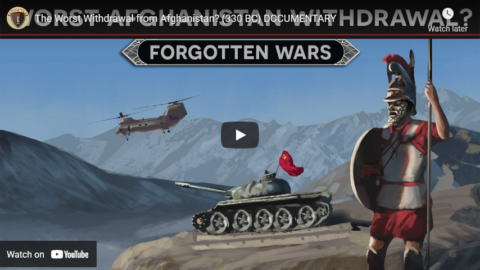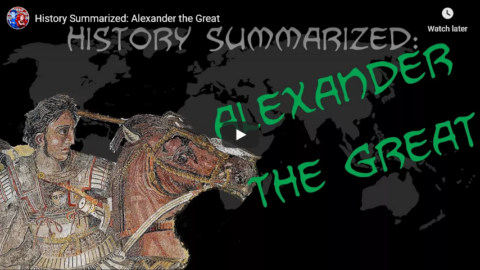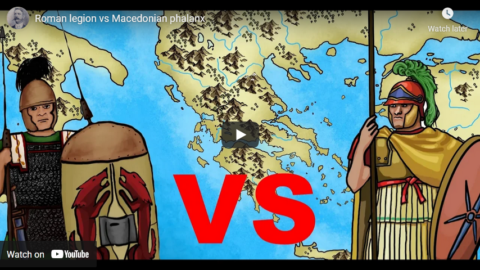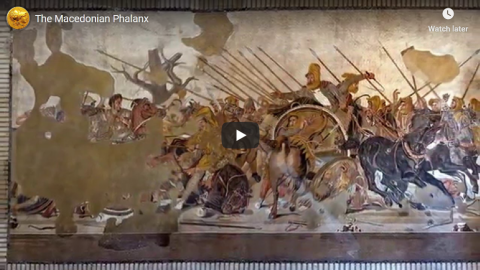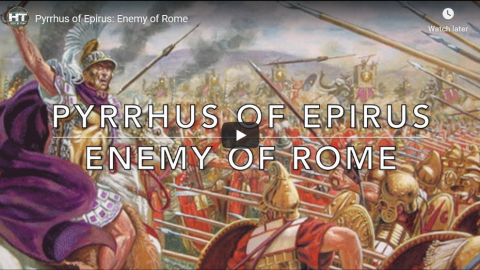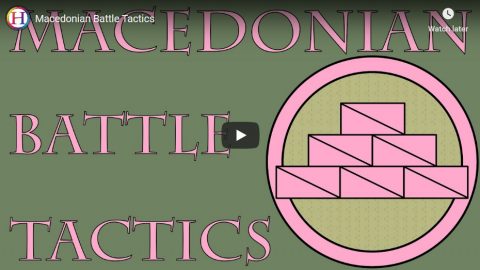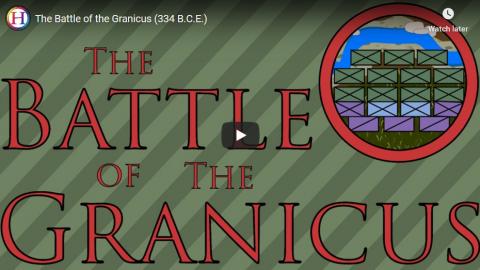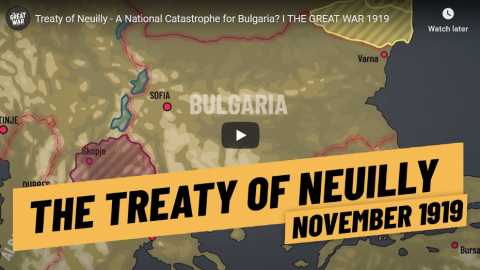… Spartan operational capabilities were extremely limited, even by the already low standards of its peers, meaning very large Greek poleis (like Athens or Syracuse).
Greek logistics in this period in general were very limited compared to either Macedonian or Roman logistical capabilities in subsequent centuries, or contemporary Persian logistics capabilities. Ironically, the most sustained study of classical Greek logistics concerns the campaigns of Xenophon (J.W. Lee, A Greek army on the March (2008)), meaning that it concerns not polis amateurs but an army of mercenary professionals, and yet compared to what the Macedonians would be able to do (see D.W. Engels, Alexander the Great and the Logistics of the Macedonian Army (1978)) half a century later in the same terrain, even these Greek logistics – probably the gold standard of their time – are astoundingly underdeveloped.
Put very briefly: Greek armies seem to have had relatively little carrying or logistics capacity. They did not seem to have generally moved with sufficient engineering tools or materials for effective field fortification or siege warfare. This is compounded by their inability to mill grain on the move (something Macedonian and Roman armies could do), which compounds problems of using local supply. You can eat unmilled grain (it can be roasted or boiled into porridge, but this is less than ideal. What they do tend to have is a high number of non-combat personal servants (precisely the sort of fellows good Roman or Macedonian generals drive out of the camp as soon as possible), who impose additional logistics burdens without much increasing the operational range or endurance of the army. Consequently, Greek armies struggled to stay out in the field throughout the year, whereas Roman and Macedonian armies were routinely capable of year-round campaigning.
Bret Devereaux, “Collections: This. Isn’t. Sparta. Part VII: Spartan Ends”, A Collection of Unmitigated Pedantry, 2019-09-27.
July 12, 2022
QotD: Greek city-state logistics in the time of the Peloponnesian War
April 19, 2022
Alexander’s Successors (the Diadochi): Series Introduction and Historical Context
Thersites the Historian
Published 24 Nov 2018This video introduces my series on Alexander’s Successors by talking about what the series will be like and by going through the historical context that the viewer might need to understand the age of the Successors.
Patreon link: https://www.patreon.com/thersites
PayPal link: paypal.me/thersites
Twitter link: https://twitter.com/ThersitesAthens
Minds.com link: https://www.minds.com/ThersitestheHis…
Steemit/dtube link: https://steemit.com/@thersites/feed
Backup Channel: https://www.youtube.com/channel/UCUrD…
February 16, 2022
Roman Republic to Empire 02 The Carthaginian Curse
seangabb
Published 5 Feb 2021[Update 2023-03-02 – Dr. Gabb took down the original posts and re-uploaded them.]
Here is the second lecture, which describes the vindictive treatment of Hannibal and Carthage, and explains this in terms of how the Second Punic War destabilised both Italy and the Roman Constutition. Between January and March 2021, Sean Gabb explored this transformation with his students. Here is one of his lectures. All student contributions have been removed.
(more…)
February 8, 2022
Roman Republic to Empire: 01 Mistress of the Mediterranean
seangabb
Published 21 Jan 2021[Update 2023-03-02 – Dr. Gabb took down the original posts and re-uploaded them.]
In 120 BC, Rome was a republic with touches of democracy. A century later, it was a divine right military dictatorship. Between January and March 2021, Sean Gabb explored this transformation with his students. Here is one of his lectures. All student contributions have been removed.
(more…)
August 30, 2021
The Worst Withdrawal from Afghanistan? (330 BC)
Invicta
Published 28 Aug 2021Afghanistan has a long history of foreign invasions and withdrawals. Today we explore the first of these chapters with the campaigns of Alexander the Great. Signup for your FREE trial to Wondrium here: http://ow.ly/C3xs30rNLaU
As the last chapter of the US war in Afghanistan appears to draw to a close, the world watches armed and civilian forces alike conduct their final evacuations. However in these moments we hear echoes of the past. The history of the so-called “Graveyard of Empires” is filled with many chapters that tell of yet another major power that has been forced to withdraw after years of spilled blood and treasure. The most well-known instances have occurred in recent memory. However the pages of Afghan history go back thousands of years. Today I wanted to take a look at one of these first major military withdrawals that may just be the most FUBAR one on record; The evacuation of Alexander the Great’s Macedonian army from Afghanistan.
In order to contextualize this conflict we first begin with a quick overview of the history of Afghanistan. No country existed by that name or with those borders in antiquity and it was instead made up of a variety of tribal coalitions and minor kingdoms for much of its early history. However it would first see foreigners begin to claim its lands with the rise of the Median Empire and the succeeding Achaemenid Empire. The lands of modern Afghanistan would now be carved into a series of Satrapies such as Bactria, Gandara, Arakhosia, Drangaian, and Areia.
Following the Ionian Revolt and the Greco Persian Wars, the Kingdom of Macedon would rise to power and take on this ancestral conflict as a way to unify the Hellenic world behind its rule. Phillip II first began to plan and invasion of the Achaemenid Empire but it would be Alexander the Great who carried out this vision. He would campaign for several years through Anatolia, the Levant, Egypt, and Mesopotamia, consuming vast swaths of the enemy’s domains. However King Darius would escape to the east. Alexander initially pursued the Great King but when he was killed by his own Lieutenant, Bessus, Alexander set off against this traitor.
In this chase, Alexander the Great would be sucked into a multi-year war to subdue the eastern satrapies that made up modern Afghanistan. We cover the most significant events of this campaign, the establishment of occupying forces, and the eventual withdrawal of the army following the death of Alexander the Great. The ensuing settler revolt would make it (in my eyes) one of the most FUBAR Afghanistan withdrawals in history that would certainly be worthy of a Vice news documentary had it existed.
The Campaigns of Alexander the Great by Arrian
In the Footsteps of Alexander the Great by Michael Wood
Alexander the Great and Bactria: The Formation of a Greek Frontier in Central Asia by Frank Holt
The Greeks in Bactria and India by W. W. Tarn
On the revolt of the Greek settlers by DiodorusCredits:
Research: Invicta
Script: Invicta
Narration: Invicta
Artwork: Penta Limited#History
#Afghanistan
#Documentary
July 16, 2021
QotD: Thebes
John Stuart Mill rated the Athenian triumph at Marathon as more important in English history than the battle of Hastings. Did he mention the almost immediate humiliation, by the Athenians, of their victorious general Miltiades? After his brilliant victory at Salamis, ten years later, Themistocles was banished from Athens and ended serving the Persians whose fleet he had destroyed. A tough house to play, old Hellas. The Athenians did the chat; the Spartans the silences. And Thebes? Supplied settings and plots, mostly in the form of awful warnings.
Paul Cartledge makes the case for a central historical role for Oedipus’s home town. As scholarly as he is revisionist, his handsomely garnished Thebes is neither freckled with footnotes nor fancy with Gibbonian phrases. The Thebans’ exceptional capacity for disastrous decisions begins in mythology with the rejection by king Pentheus of the androgynous divinity Dionysus, dramatised in Euripides’s Bacchae.
There followed the king’s death at the hands of his own raving, Bacchanalian mother and the seismic ruin of the city. Homosexuality has no place in Cartledge’s index, but Oedipus’s father Laius, mythical king of Thebes, is the first man said to have swung both ways. The Sacred Band, in classical times, was a select Theban formation of pairs of male lovers, all full citizens.
However gay ancient Hellenes were (not all that, some say, certainly not all), the Sacred Band’s reputation suggests that a zest of scandal accompanied its bravura. Sexual aberration was integral to their city’s fame. Oedipus’s inadvertent marriage with his own mother, Jocasta, led to the mutual slaughter of their sons, as well as to the refusal of his daughter Antigone to marry Haemon, the prince chosen for her by King Creon. Creon then walled her up, the original ochi (NO!) girl. It needed the Athenian Sophocles to make a play out of it. Modern Greeks celebrate ochi day every 28 October, anniversary of the date in 1941 when their dictator, Ioannis Metaxas, refused to surrender to Mussolini and so refurbished himself as a national hero.
Thebes and the confederation of Boeotian states it headed figured on no honours board during the fifth century BC, presumed, until recently, to be the Golden Age of ancient Hellas. When Xerxes marched into Greece in 480 BC, the Theban oligarchs took advice from the Delphic oracle — they may well have leaned on it first — and so had a divine excuse for not offering any obstacle to the barbarian invaders.
Half a century later, the Thebans’ levelling of plucky little Plataea, the Athenians’ sole ally at Marathon, was a lowlight of the Peloponnesian war. It was matched only by their vindictiveness after defeating an Athenian army (including infantryman Socrates and the subaltern Alcibiades) at Delium. They left the enemy dead to rot rather than hand over the bodies.
[…]
Mythical Thebans figure again and again in the work of the great Athenian dramatists, almost always as bad examples. The city and its neighbours may have originated political federation, but it produced no remarkable artist, no Demosthenic orator, no great dramatist. As far as the arts are concerned, Cartledge cites only Pronomus, the pied piper whose mastery of the aulos (not so much flute as “double-oboe”) won wide renown. Nostalgic seniors may recall Danny Kaye’s line, “The oboe, it is clearly understood / Is an ill-wind that nobody blows good.”
Thebes specialised in wrong turnings. During its two decades of ascendancy in the fourth century BC, it sought to keep Macedon in its place by holding the young Philip II hostage. Having learnt the military skills of his captors, the unforgiving outsider returned to chasten them. His son Alexander finished the job by literally flattening the city, save for the house of its greatest poet, Pindar, and the temples of gods whose favours he hoped to enjoy when he set off to purge and pillage the Persians. No second Pindar hymned his conquests; the Greeks never took him for one of their own. His death in his early thirties prompted an immediate rebellion against Macedonian dominion.
Frederic Raphael, “Thick as Thebans”, The Critic, 2021-03-25.
February 9, 2021
History Summarized: Alexander the Great
Overly Sarcastic Productions
Published 19 Sep 2017Linguistically speaking, Alexander means “Defender of Men” from the Greek “alexo“, defend, and “aner/ander“, man. I’ll never be able to not internally think of his name as just meaning “Alex-Man”.
Oh, yeah, also he conquered an empire or something? IDK. I stopped paying attention after his bland name.
PATREON: www.patreon.com/OSP
MERCH LINKS:
Shirts – https://overlysarcasticproducts.threa…
All the other stuff – http://www.cafepress.com/OverlySarcas…Find us on Twitter @OSPYouTube!
February 7, 2021
Roman legion vs Macedonian phalanx
Epimetheus
Published 13 Aug 2018Roman legion vs Macedonian phalanx (Macedonian wars)
Battle of Pydna 168 BC and battle of Cynoscephalae 197 BCSupport new videos from Epimetheus on Patreon! 😀
https://www.patreon.com/Epimetheus1776roman legion, roman legion tactics, macedonian phalanx, Macedonian phalanx tactics, Macedonian phalanx vs roman legion, ancient Macedonian army, ancient roman army, roman army, Roman legionary, rome vs Greece, Rome vs Macedon, roman army weapons, Roman army tactics, Macedonian wars, battle Cynoscephalae, battle of Pydna, republican Roman army, Roman maniple, Roman republic, documentary, ancient Rome documentary, ancient Greece documentary, rome documentary, battle of magnesia, rome selucid empire, Roman empire vs selucid empire, diadochi, ancient,
February 4, 2020
The Macedonian Phalanx
HistoryMatters
Published 30 Jan 2016A short introduction to the Macedonian phalanx, from conception to demise.
January 20, 2020
Pyrrhus of Epirus: Enemy of Rome
History Time
Published 2 Dec 2017A brief look at one of the first and greatest adversaries of the Romans.
Some of the maps used in this and other History Time videos were produced by the incredible Battles of the Ancients. Check out the awesome website below for your ancient history fix.
http://turningpointsoftheancientworld.com/Music:-
Two Steps From Hell – “Hearts of Courage”
https://www.youtube.com/watch?v=eYj8c…
BrunuhVille – “Song of the North” (Alt. Version)
https://www.youtube.com/watch?v=RHAFr…
Adrian Von Ziegler – “Moonsong”
https://www.youtube.com/watch?v=ifQ3J…If you liked this video and have a spare dollar you can help to support the channel here:-
http://www.patreon.com/historytimeUKAre you a budding artist, illustrator, cartographer, or music producer? Send me a message! No matter how professional you are or even if you’re just starting out, I can always use new music and images in my videos. Get in touch! I’d love to hear from you.
I’ve also compiled a reading list of my favourite history books via the Amazon influencer program. If you do choose to purchase any of these incredible sources of information, many of which form the basis of my videos, then Amazon will send me a tiny fraction of the earnings (as long as you do it through the link) (this means more and better content in the future) I’ll keep adding to and updating the list as time goes on:-
https://www.amazon.com/shop/historytimeI try to use copyright free images at all times. However if I have used any of your artwork or maps then please don’t hesitate to contact me and I’ll be more than happy to give the appropriate credit.
—Join the History Time community on social media:-
Patreon:-
https://www.patreon.com/historytimeUK
Instagram:-
https://www.instagram.com/historytime…
Twitter:-
https://twitter.com/HistoryTimeUK
January 11, 2020
Logistics of Alexander the Great in His Campaign
Military History Visualized
Published 11 Jan 2016Patreon: https://www.patreon.com/join/mhv
Alexander the Great is well known for his tactics on the battlefield. Some aspect that is often forgotten is that victory on the battlefield requires well supplied troops. This is especially true, because Alexander’s conquest covered a vast area.
See the YouTube description for a lengthy sources list.
January 6, 2020
Macedonian Battle Tactics
Historia Civilis
Published 5 Jul 2017Patreon | http://patreon.com/HistoriaCivilis
Donate | http://www.paypal.com/cgi-bin/webscr?…
Merch | http://teespring.com/stores/historiac…
Twitter | http://twitter.com/HistoriaCivilis
Website | http://historiacivilis.comSources:
Parallel Lives, by Plutarch: http://amzn.to/2sOfr4O
Alexander of Macedon, by Peter Green: http://amzn.to/2rMJqpn
Alexander the Great, by Robin Lane Fox: http://amzn.to/2sOKqh3
Ghost on the Throne, by James Romm: http://amzn.to/2tpuNxqWe are a participant in the Amazon Services LLC Associates Program, an affiliate advertising program designed to provide a means for us to earn fees by linking to Amazon.com and affiliated sites.
Music:
“Seeing the Future,” by Dexter Britain
“Infados,” by Kevin MacLeod
“Drums of the Deep,” by Kevin MacLeod
“Hallon,” by Christian Bjoerklund
December 2, 2019
The Battle of the Granicus (334 B.C.E.)
Historia Civilis
Published 30 Nov 2019Patreon | http://patreon.com/HistoriaCivilis
Donate | http://www.paypal.com/cgi-bin/webscr?…
Merch | http://teespring.com/stores/historiac…
Twitter | http://twitter.com/HistoriaCivilis
Website | http://historiacivilis.comSources:
Arrian, The Anabasis of Alexander, Book 1 | https://amzn.to/37F4qo3
Diodorus Siculus, “The Library of History,” Book 17 | https://amzn.to/2qPDP71
Plutarch, “Parallel Lives: The Life of Alexander” | https://amzn.to/2QUHXxu
—
Ernst Badin, “The Battle of the Granicus: A New Look,” from “Collected Papers on Alexander the Great” | https://amzn.to/37zeuyO
Peter Green, Alexander of Macedon | https://amzn.to/2OogimY
Robin Lane Fox, Alexander the Great | https://amzn.to/2OlzZvx
Philip Freeman, Alexander the Great | https://amzn.to/35wVtv4Music:
“IMF,” by Dot
“Heliograph,” by Chris Zabriskie
“Infados,” by Kevin MacLeod
“The House Glows (With Almost No Help),” by Chris Zabriskie
“Hallon,” by Christian BjoerklundWe are a participant in the Amazon Services LLC Associates Program, an affiliate advertising program designed to provide a means for us to earn fees by linking to Amazon.com and affiliated sites.
November 20, 2019
Treaty of Neuilly – A National Catastrophe for Bulgaria? I THE GREAT WAR 1919
The Great War
Published 19 Nov 2019SPONSORED: Install Raid for Free ✅ IOS: http://bit.ly/334B7Yl ✅ ANDROID: http://bit.ly/341srDB
Start with💰50K silver and get a Free Epic Champion 💥 on day 7 of “New Player Rewards” program**Ads like this support the production of our channel and keep it free to watch for everyone
» SUPPORT THE CHANNEL
Patreon: https://www.patreon.com/thegreatwar
Merchandise: https://shop.spreadshirt.de/thegreatwar/» SOURCES
Borodziej, Wlodzimierz and Maciej Gorny. Der Vergessene Weltkrieg. Europas Osten 1912-1923. Band II – Nationen 1917-1923 (wbg Theiss, 2018).
Ganev, P. “The relations between Bulgaria and the FYR of Macedonia in the context of EU integration,” Master Thesis, 2014.
Gerwarth, Robert. The Vanquished. Why the First World War Failed to End, 1917-1923 (Penguin, 2017).
Khristov, Khristo. “Bulgaria, the Balkans, and the Peace of 1919,” in Pastor, Peter, ed. Revolutions and Interventions in Hungary and its Neighbor States, 1918-1919 (New York: Columbia University Press, 1988).
Lampe, John. “Stamboliiski’s Bulgaria and Revolutionary Change, 1918-1923,” in Pastor, Peter, ed. Revolutions and Interventions in Hungary and its Neighbor States, 1918-1919 (New York: Columbia University Press, 1988).
Leonhard, Jörn. Der überforderte Frieden. Versailles und die Welt 1918-1923 (CH Beck, 2018).
Macmillan, Margaret. The Peacemakers: Six Months that Changed the World (London: John Murray, 2001).
Mihaylovski, Stoyan. “On the Treaty of Neuilly,” in Напред (Forward). Originally published November 4th, 1919. Republished on November 27th, 2018. Retrieved via Dir.bg.
Minkov, Stefan Marinov: “Neuilly-sur-Seine, Treaty of”, in: 1914-1918-online. International Encyclopedia of the First World War, ed. by Ute Daniel, Peter Gatrell, Oliver Janz, Heather Jones, Jennifer Keene, Alan Kramer, and Bill Nasson, issued by Freie Universität Berlin, Berlin 2017-02-20.
Pantev, Andrei. “The Border Line Between Sympathy and Support: the United States and the Bulgarian Territorial Question at the Paris Peace Conference in 1919,” in Southeastern Europe, 8, pts 1-2 (1981): 171-197.
Ristović, Milan: “Occupation during and after the War (South East Europe)”, in: 1914-1918-online. International Encyclopedia of the First World War, ed. by Ute Daniel, Peter Gatrell, Oliver Janz, Heather Jones, Jennifer Keene, Alan Kramer, and Bill Nasson, issued by Freie Universität Berlin, Berlin 2014-10-08.
Toshev, Stefan. Pobedeni bez da badem biti (Beaten without being defeated), 1924.
Vazov, Vladimir. Zhivotopisni belejki (Lifetime notes). Re-published by Bulgarian History “BI 93 OOD”, 2018.
Yotov, Petko et al. Bulgaria in the First World War (1915-1918), a short encyclopedia (2014).
Documentary film: Българският политик Теодор Теодоров – държавник от първа величина, ISTORIYA.BG, 03.12.2018
Съюз на македонските емигрантски организации в България – “Memoir presented to the governments of the United States of America, of Great Britain and Ireland, of France, of Italy and of Japan”, София, 1919 година (http://strumski.com/biblioteka/?id=1830)»CREDITS
Presented by: Jesse Alexander
Written by: Jesse Alexander
Director: Toni Steller & Florian Wittig
Director of Photography: Toni Steller
Sound: Toni Steller
Editing: Toni Steller
Mixing, Mastering & Sound Design: http://above-zero.com
Maps: Daniel Kogosov (https://www.patreon.com/Zalezsky)
Research by: Jesse Alexander
Fact checking: Florian WittigChannel Design: Alexander Clark
Original Logo: David van StepholdA Mediakraft Networks Original Channel
Contains licensed material by getty images
All rights reserved – Real Time History GmbH 2019
April 7, 2019
Epic Moments in History – The 9 Lives of Alexander the Great
Invicta
Published on 4 Sep 2017Alexander the Great is one of the most famous historical figures of all time. Yet many are unaware of the 9 times he cheated death over the course of his epic campaigns into the east!
Support future documentaries: https://www.patreon.com/InvictaHistory
Twitter: https://twitter.com/InvictaHistoryVideo Credits:
Research – Invicta
Script: Invicta
Narration – Invicta
Artwork – Robbie McSweeney (https://www.artstation.com/artist/rob…)Bibliography:
Alexander the Great by Phillips Freeman
The Campaigns of Alexander by ArrianMusic: “Rome: Total War OST” by Jeff van Dyck
“Total War: Rome II OST” by Richard Beddow

